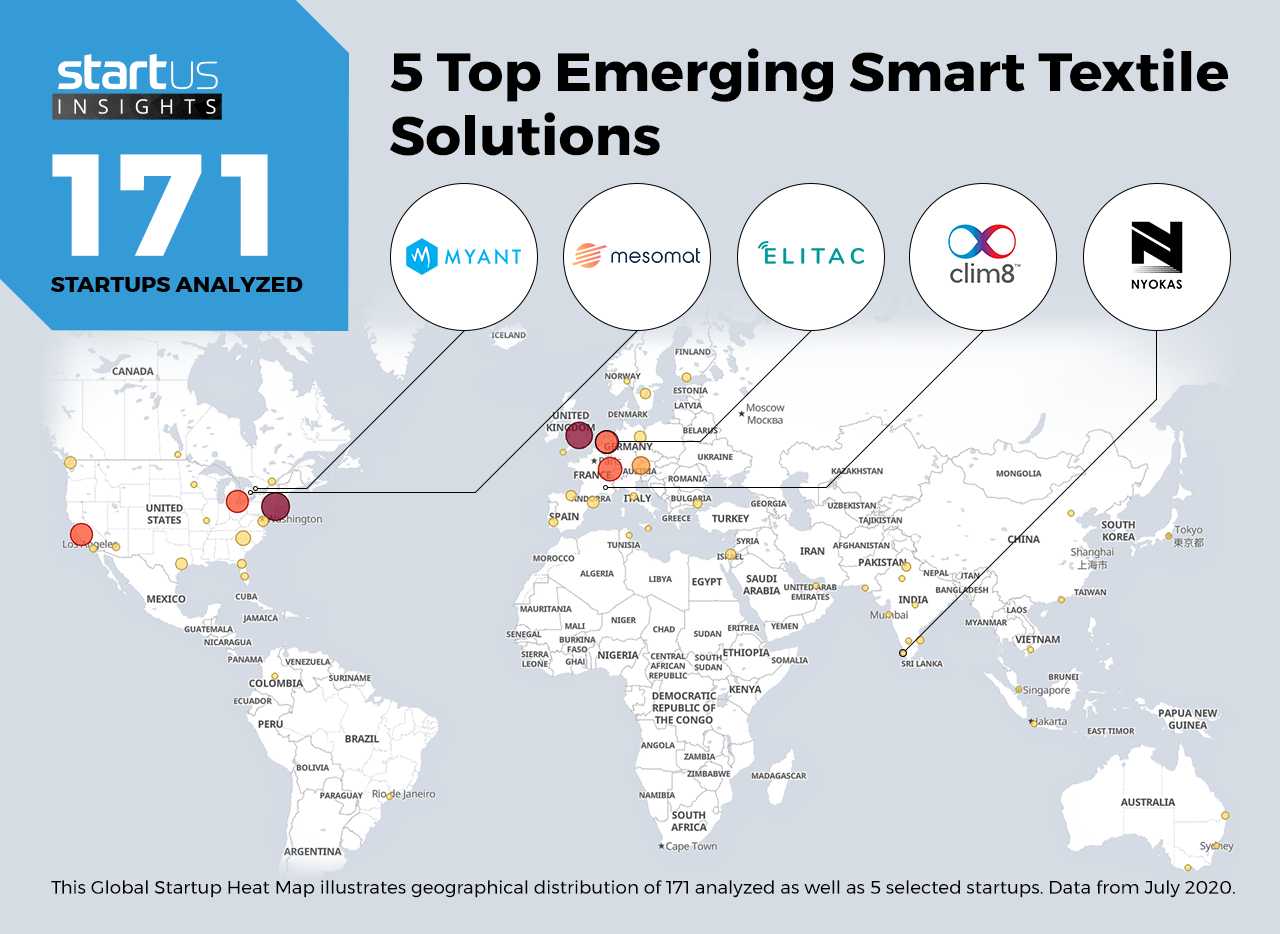Staying ahead of the technology curve means strengthening your competitive advantage. That is why we give you data-driven innovation insights into the wearables industry. This time, you get to discover five hand-picked startups developing smart textile solutions.
Out of 171, the Global Startup Heat Map highlights 5 Top Smart Textile Solutions
The insights of this data-driven analysis are derived from the Big Data and Artificial Intelligence (AI)-powered StartUs Insights Discovery Platform, covering 2 093 000+ startups and scaleups globally. The platform gives you an exhaustive overview of emerging technologies and relevant startups within a specific field in just a few clicks.
The Global Startup Heat Map below reveals the distribution of the 171 exemplary startups and scaleups we analyzed for this research. Further, it highlights five startups that we hand-picked based on criteria such as founding year, location, funding raised, and more. You get to explore the solutions of these five startups and scaleups in this report. For insights on the other 166 smart textile solutions, get in touch.
MesoMat develops Conductive Textiles
Conductive textiles find applications in electronic textile applications across various industries, including sports, healthcare, and entertainment. They are used to produce sensors and smart garments for health and performance monitoring. Innovations in conductive textiles, like flexibility and biosensing, make it easier to produce smart clothes from such smart fabric.
Canadian startup MesoMat develops a proprietary wire that conducts electricity. The startup uses the physics of self-assembly to develop ultra-durable fiber, which is stretchable by over 50% while retaining conductivity. The fabric is also easy to interface with traditional electronic components using MesoMat’s proprietary soft solder.
Nyoka Technologies offers Soft Electronic Circuits
The wearable market is constantly growing with a range of new products. These include smart shirts that track vital signs and smart jackets that improve women’s safety. Soft electronic circuit systems play a critical role in the development of such smart fabrics. They integrate into textile products and provide fabrics with sensing and analytics capabilities.
Nyoka Technologies is an Indian startup that designs and manufactures soft and flexible circuit systems that sense, actuate, and analyze data. The startup offers customizable solutions to meet the size, shape, and functionality needs of its customers. It develops Zeal, a safety jacket for women, that detects an attack and automatically deters the attacker with a mild electric shock. It also sends location info along with an SOS alert.
Clim8 makes Intelligent Thermal Textile
Temperature monitoring and regulation are important applications of e textile solutions. Startups make innovative as well as intelligent thermal textile technologies to monitor body heat. Such solutions enable smart garments that sense the user’s body temperature and regulate heating and cooling to ensure comfort.
French startup Clim8 provides intelligent thermal systems that integrate into temperature-regulating garments. The startup’s technology includes tiny thermal sensors that monitor the user’s skin temperature. It then analyzes the environment, user profile, and other specific needs to activate heat and regulate body temperature.
Myant enables Textile Computing
As smart fabrics are integrated into the everyday lives of people, it enables an excellent opportunity to monitor various aspects of end consumers. Startups thus combine textiles with various monitoring and analytics solutions to solve challenges across industries. For example, some startups use non-invasive sweat monitoring to recommend water intake for runners and cyclists.
Myant is a Candian startup that knits sensors and actuators into everyday textiles to track body vitals and other parameters. The startup serves multiple industries, including healthcare, fitness, workplace safety, automotive, aerospace, and connected environments. Myant is also developing special offerings to tackle the COVID-19 pandemic. These include biometric textiles for remote monitoring and triaging for patients as well as antiviral masks and gloves for essential service workers.
Elitac provides Flexible Electronic Circuits
Companies in the wearables industry still rely on rigid electronic components for sensing, providing power, and other functions. Disadvantages of these elements include discomfort to the user and damages from machine wash. On the other hand, flexible electronic circuits are comfortable to wear, stretchable, washable, and easily integrable into clothing. Therefore, they improve the acceptance of smart wearables among the general public, increasing revenue.
Dutch startup Elitac specializes in flexible electronics and the application of haptic feedback in smart garments. The startup allows clients from various industries to develop new products, from concept to initial production. Elitac produces wearables that assist people with severe balance disorders. In addition, the startup makes electronic textiles for rehabilitation, haptic feedback shirts for neurosurgeons, and haptic navigation belts for soldiers.
Discover more Startups
Startups such as the examples highlighted in this report focus on conductive e textiles, flexible electronics, and body analytics. While all of these technologies play a major role in advancing the industry, they only represent the tip of the iceberg. To explore wearable solutions in more detail, let us look into your areas of interest. For a more general overview, download one of our free Industry Innovation Reports to save your time and improve strategic decision-making.









